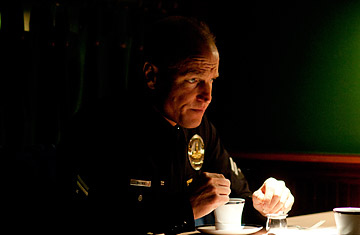
Woody Harrelson in Rampart
Policemen with fearsome reps need punchy nicknames, especially if their real names are as bland as Dave Brown and Joe Cooper. So the L.A.P.D. Detective in Oren Moverman's Rampart is known as Dave "Date Rape" Brown, because years ago he killed a man suspected of being a sexual predator. And the Dallas cop in Killer Joe is — Killer Joe Cooper.
The two movies, on display this week at the Toronto International Film Festival, have more in common than peace officers with mean monikers. They are a pair of deranged, charismatic cops played by Texas charmers who made their reps in light comedy. Woody Harrelson, of Cheers and medicinal weed fame, is Dave Brown in Rampart, which reunites him with the director of his Oscar-nominated role in The Messenger. And Matthew McConaughey, who earlier this year took a break from insipid romcoms and made a strong dramatic impression as the hotshot attorney in The Lincoln Lawyer, slips into Cooper's reptilian skin in the William Friedkin film of Tracy Letts' 1993 play. Neither movie is wholly satisfying, but both are brazenly weird character studies — Killer Joe eventually leaps into psycho territory — that give their stars a chance to work dark and dangerous variations on the agreeable personalities they've honed for a couple of decades.
Harrelson's Dave, in the screenplay by Moverman and L.A. crime poet James Ellroy, is a dinosaur of the city's blue boys. He uses old-fashioned methods of interrogation, cracking a suspect's head to elicit a crack-house address. "This used to be a glorious soldiers' department," Dave tells a young female cop of mixed-race background. "And now it's — you." He also insists, "I am not a racist. I hate all people equally." But this is 1999, when a real-life scandal in the Rampart precinct exposed the corruption and brutality of many policemen against the neighborhood's predominantly Hispanic citizens. So when Dave beats up a man whose car slammed into his, and his punishment is videotaped and aired on TV, he's fingered to take a fall. Of course Dave won't jump: beyond being mulish, he's as eloquent in legal jargon as he is in street talk. Someone high up will have to be as crafty and amoral as he is.
Moverman has assembled a plush supporting cast: Steve Buscemi as the D.A., Sigourney Weaver (on the mark in her few scenes) as an L.A.P.D. lawyer, Ice Cube as an Internal Affairs investigator and Ned Beatty as a tired, retired cop who advises Dave, "You could just stop beatin' people up." Cynthia Nixon and Anne Heche play Dave's sister-wives, not in the Mormon sense but just as complicated: he married one woman, then her sister, has a daughter by each and is divorced from both but still lives next door to them. Robin Wright lends her weary luster to Linda, a mysterious figure Dave meets on one of his night-crawls. "You are the most beautiful woman I've ever met," he tells her. "In this bar." He's also wary of Linda's instant attraction to him: "You have a courtroom suit and litigator eyes." That's an example of Dave's gift for quickly appraising people's motives — part of what makes him such a good bad cop.
As grimy visually as it is gritty in its narrative, Rampart declares itself an indie film rather than a mainstream movie by spending lots of time studying its star's distinct profile while he prowl-cars through the L.A. night. That's often a sign of directorial indulgence or vacuity, but Harrelson rewards watching; he's no less potent at rest than when he explodes in calculated rage. Moverman (who halfway through the Toronto festival had yet to find a U.S. distributor for the film) would be wise to engage the actor again, and extend The Messenger and Rampart into a trilogy. "We've done two movies with Woody in uniform, as a soldier and a police officer," the director told the Los Angeles Times. "So I guess now he has to play a postal worker."
